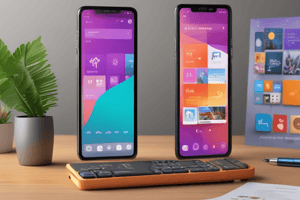Podcast
Questions and Answers
What is a key feature of apps that enhances user engagement and provides a more immersive experience?
What is a key feature of apps that enhances user engagement and provides a more immersive experience?
- Interactivity (correct)
- User-Friendliness
- Mobility
- Accessibility
Which feature of apps allows users to access them from their preferred devices?
Which feature of apps allows users to access them from their preferred devices?
- Interactivity
- User-Friendliness
- Accessibility (correct)
- Real-time updates
In the context of apps, what is meant by 'mobility' as a defining feature?
In the context of apps, what is meant by 'mobility' as a defining feature?
- Apps are interactive
- Apps can be accessed from anywhere (correct)
- Apps receive real-time updates
- Apps are user-friendly
What role do real-time updates play in many apps?
What role do real-time updates play in many apps?
Why is an intuitively organized interface design crucial to app success?
Why is an intuitively organized interface design crucial to app success?
What is a key feature of successful interface design?
What is a key feature of successful interface design?
Which aspect is important for an interface to be considered usable?
Which aspect is important for an interface to be considered usable?
What role do apps play in research collaboration according to the text?
What role do apps play in research collaboration according to the text?
Which function do apps like Zooniverse provide for the public?
Which function do apps like Zooniverse provide for the public?
What is the main purpose of the app Eyewire mentioned in the text?
What is the main purpose of the app Eyewire mentioned in the text?
Why are apps increasingly used in scientific research according to the text?
Why are apps increasingly used in scientific research according to the text?
Flashcards are hidden until you start studying
Study Notes
Apps: Understanding their Features, Functions, Interface, and Applications in Science
Apps, short for applications, are software designed for specific tasks and deployed on mobile devices, computers, or other hardware platforms. They've become an integral part of our daily lives, offering diverse functionalities and enhancing our experiences. In this article, we'll delve into the features, functions, interface design, and use cases of apps, with a special emphasis on their role in scientific discovery.
Features and Functions
Apps are created to solve particular problems, provide quick access to information, or facilitate specific tasks. Their defining features include:
- User-Friendliness: Apps simplify user interaction, often by employing intuitive interfaces and streamlined navigation.
- Accessibility: They're designed to be available on multiple platforms, allowing users to access them from their preferred devices.
- Mobility: Apps enable users to perform tasks or access data from anywhere, making them incredibly versatile.
- Interactivity: They often incorporate interactive elements, which enhance user engagement and provide a more immersive experience.
- Real-time updates: Many apps provide real-time updates, allowing users to receive the latest information.
Interface Design
An effective interface design is crucial to the success of an app. It must be intuitively organized, aesthetically pleasing, and easy to navigate. Factors that contribute to successful interface design include:
- Simplicity: The interface should be simple, easy to understand, and free of clutter.
- Consistency: The interface should maintain consistent visual and functional standards throughout the app.
- Accessibility: The interface should be accessible to individuals with disabilities, conforming to accessibility guidelines.
- Usability: The interface should be usable on different devices, regardless of screen size or resolution.
- Responsive: The interface should be responsive, adapting to different devices and screen sizes.
Use Cases
Apps have revolutionized various aspects of our lives, and they're increasingly being used in scientific research. Some examples of app use cases in science include:
- Data Collection: Apps can be used to collect data in the field, allowing scientists to gather information quickly and easily.
- Research Collaboration: Apps facilitate collaboration among researchers, enabling them to share data, tools, and resources.
- Real-time Analysis: Apps can be used to analyze data in real-time, allowing researchers to make informed decisions quickly.
- Scientific Visualization: Apps can be used to visualize complex data, making it easier for researchers to understand and interpret their findings.
- Citizen Science: Apps can be used to engage the public in scientific research, enabling them to contribute to scientific discovery.
Science
Apps are increasingly being used in scientific research to collect data, facilitate collaboration, and enable real-time analysis. Some notable apps used in scientific research include:
- Eyewire: A game-based app that allows users to help map the brain by identifying the connections between neurons.
- Molecular Workbench: A tool that enables the exploration of molecular structures and properties.
- Zooniverse: A platform that enables the public to contribute to various research projects, such as classifying galaxies or transcribing historical documents.
- Epoc: A tool that enables the collection of neurological data during everyday activities.
In conclusion, apps have transformed the way we live and work, and they're increasingly being used in scientific research to collect data, facilitate collaboration, and enable real-time analysis. Their user-friendly interface design and diverse functionalities make them an indispensable tool for scientists and researchers. With the continued development of innovative apps in the scientific field, the future of research promises to be more collaborative, accessible, and engaging than ever before.
Studying That Suits You
Use AI to generate personalized quizzes and flashcards to suit your learning preferences.




